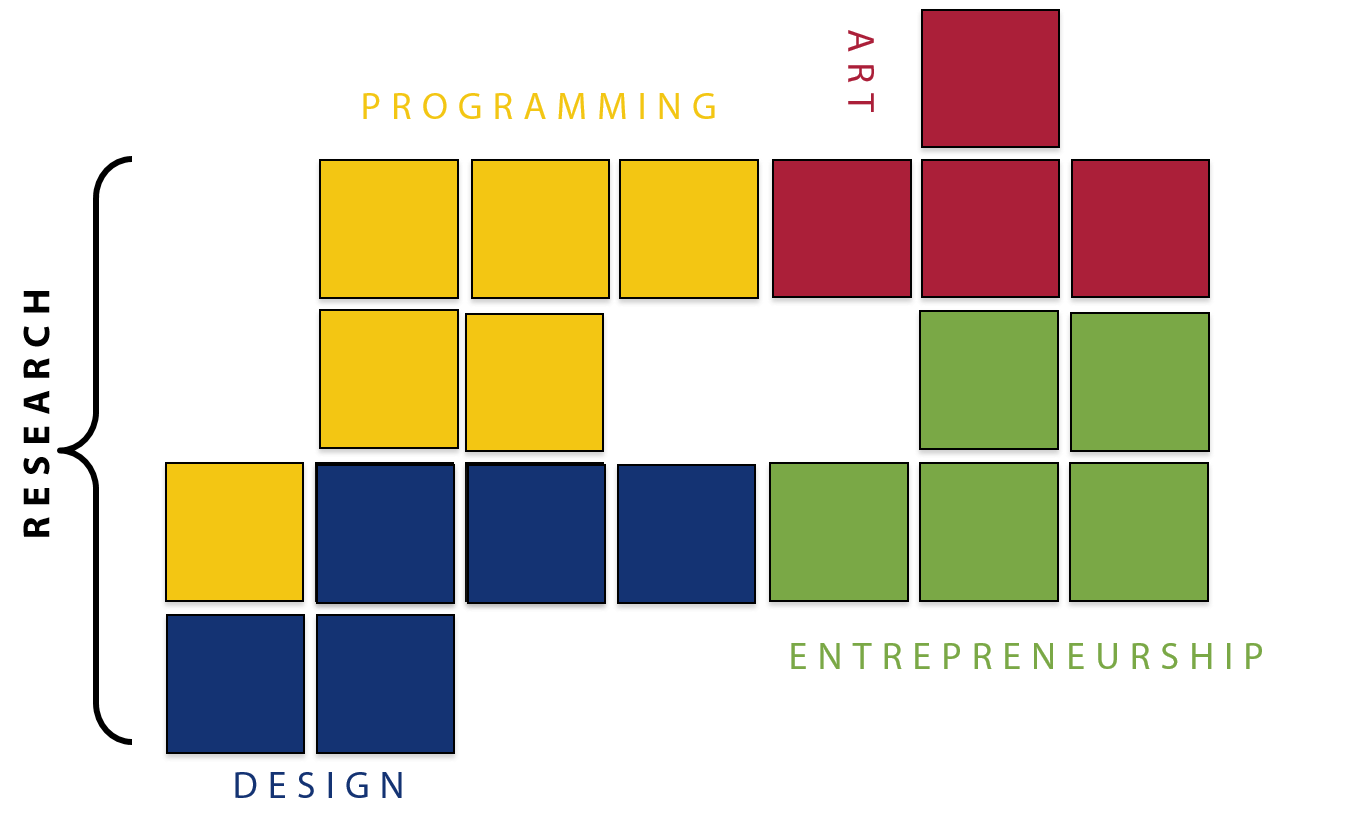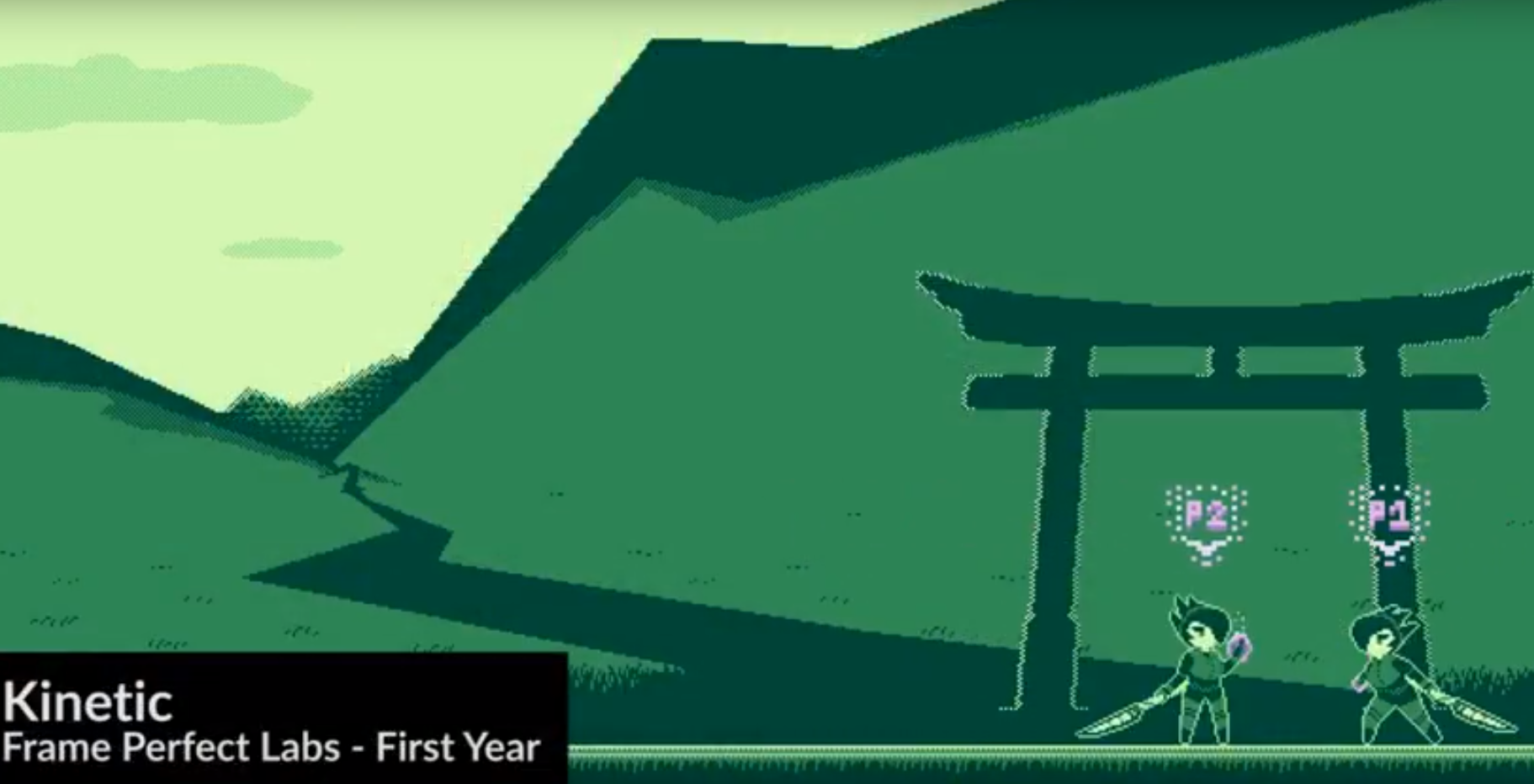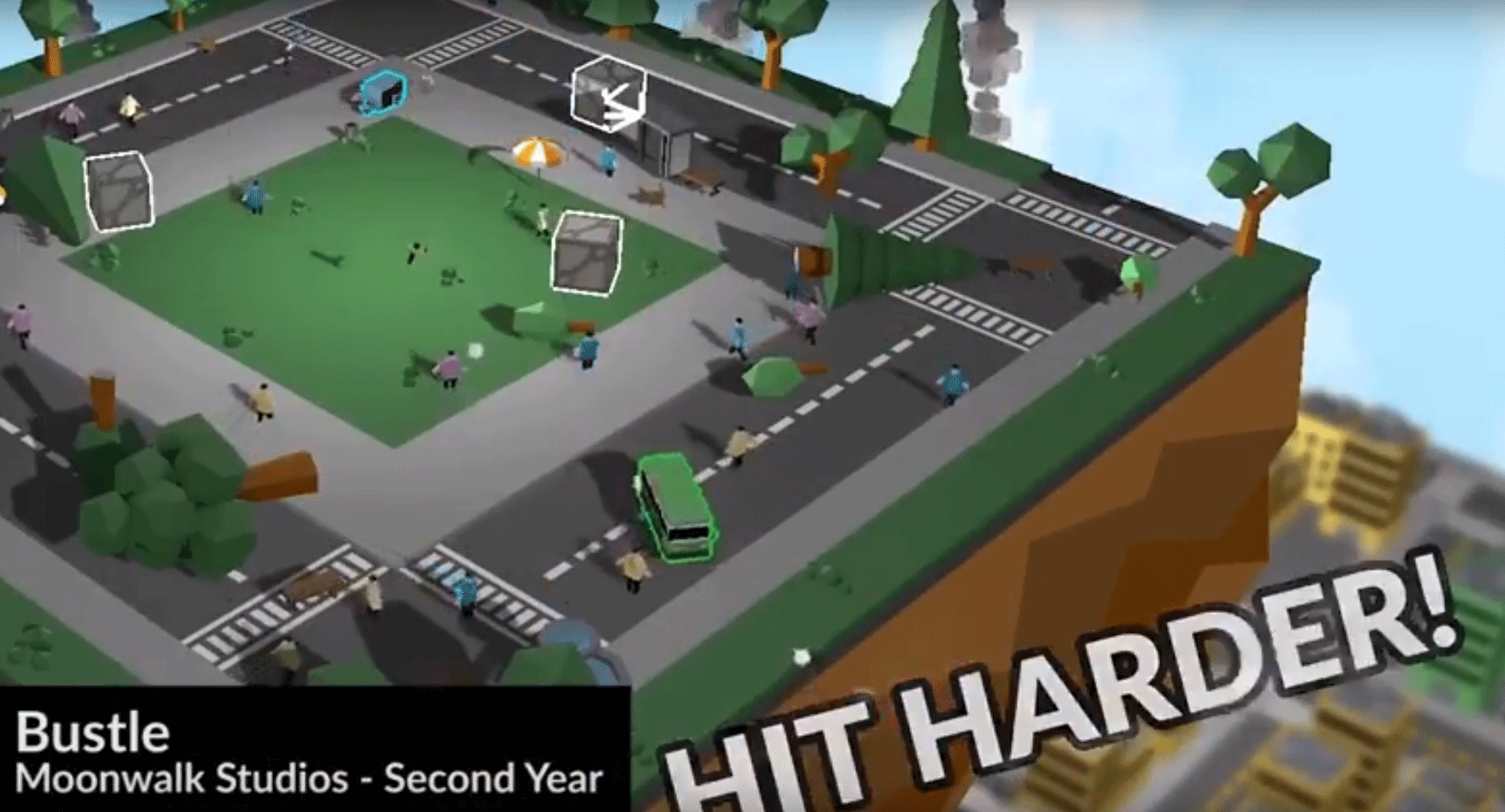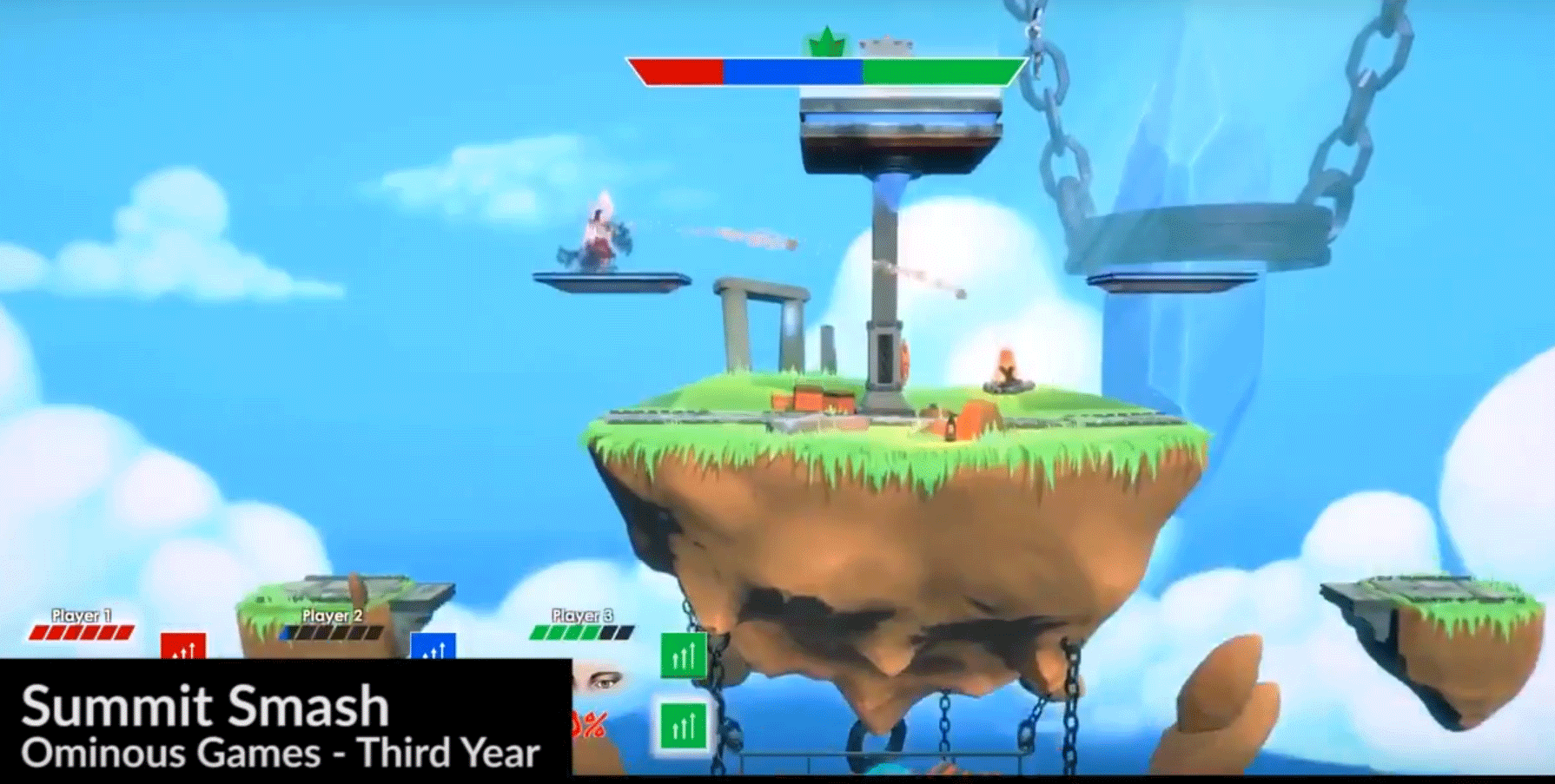Courses
Courses available in the Game Development and Interactive Media program will provide you with the opportunity to acquire the knowledge and develop the skills required to quickly advance your career. Courses are grouped in four main areas: programming, art, design, and entrepreneurship. Each area is supported by the faculty through their teaching and research experience.

Here are some of the courses associated with all areas of Game Development. For the full list, please refer to the Program Maps Section. For specific information on the current catalogue, please visit the Game Development and Interactive Media Calendar.
FIRST YEAR - THE FUNDAMENTALS
-
GAME DESIGN
This course will introduce you to the basic concepts in game design. You will be introduced to rapid iteration techniques and the non-digital design of board games to paper-prototype your game mechanics. Learn how to design basic board, card, dice and digital games and gain practice in designing game mechanics.
-
ART
From the perspective of designing asset for video games, in this course you will get an introduction to the fundamental concepts of graphics, principles of light and shadow, and visual image creation. Focus will be placed on the use of traditional techniques and how they transition to digital techniques. You will get the chance to develop and refine your creative skills for further developing game concepts.
-
MATH/PHYSICS
This course will introduce you to the basic mathematical concepts you will need to be an effective game programmer, designer, producer or artist. You will explore linear algebra concepts as well as discrete math concepts and how they relate to game development.
-
PROGRAMMING
This course introduces you to general computer programming principles, logics, and problem solving skills. Topics include data types, variables, operators, expression, statements, blocks, control flow statements, functions (routines), arrays, pointers, and basic concepts of structures. The course uses a programming language such as C or C++ for illustrating the principle programming concepts.
-
ENTREPRENEURSHIP
This course introduces entrepreneurship as a discipline. In your studies , you will cover all facets of entrepreneurship, including economics, society and intrapreneuring, You will also cover issues such as starting and managing a successful new business venture, including new venture capital, creation, and management.
SECOND YEAR - BEGINNER 3D
-
ANIMATION/LOCOMOTION
This course introduces you to the concepts underlying computer animation and provides a solid basis of animation concepts for game development. Topics include traditional animation techniques, spline animation, interpolation and advanced level contents focusing on theoretical aspects of animation development.
-
INTERMEDIATE GAME DESIGN
This course introduces the concepts behind game design and production. Topics include story versus narrative, character development, design documentation, idea formation, prototyping and the game production pipeline. Students will be required to utilize an existing game engine to develop a prototype.
-
COMPUTER GRAPHICS/SHADERS
This course introduces the fundamental knowledge of colour and light covering the various processes on how colour images are captured and recorded in chemical and digital imaging systems. You will learn ways to manipulate various project components in the production and post-production process using an imaging system.
This course will help you develop an understanding of the methods appropriate to research in colour imaging. You will study methods for image acquisition and reproduction in the context of production systems.
The basic concepts, tools and techniques of computer graphics are described, and the fundamental transformations of scaling, translation, rotation, windowing, hidden line removal, image processing and clipping are presented.
Mathematical tools needed for the geometrical aspects of computer graphics are discussed. Particular emphasis will be placed on new developments in microcomputer graphics.
You will be expected to develop a graphics application using either C++ and/or other programming language with available graphics libraries.
-
MODELING/RIGGING
This course is an introduction to creation of 3D art assets using computer graphics (CG) software and the consumption of those assets in games. The course will introduce students to CG software similar to Autodesk Maya to create and animate art assets for their games with a technical-art focus. The art to engine pipeline will be introduced where the students will integrate the assets created in existing games and game engines and develop an efficient art-to-engine pipeline.
-
PROJECT MANAGEMENT
This course focuses on Information Technology (IT) and game development projects. The idea is to get you familiarized with the basic project management theories relevant to your projects. It introduces the concepts and tools that pertain to the phases of the project life cycle. In particular, the course will present contrast between IT and game development.
-
GAME SOUND
This course is an introduction to digital sound and audio concepts and their applications in multimedia production. It introduces you to the concepts of programming with sound and audio data. Throughout the course you will apply the theoretical concepts in gaming related programming projects.
This course presents an overview of gitter, dither and word lengths, high sample rates, distortion, headroom, monitor calibration, metering, depth perception, compression and expansion, equipment interconnection and other digital audio related topics.
THIRD YEAR - INTERMEDIATE 3D
-
GAME ENGINE DESIGN
Game engine design focuses on providing the tools and skills to develop extensible software that allows further expansion of the capabilities of current consumer-level game engines. Tool creation takes a front seat to allow the creation of plugins for integrating sound, animations, physics, human interface devices, assets and more, to increase the flexibility of your engine towards developing a game.
-
NETWORKING
Network history and architectures; reference Model for Open Systems Interconnection (OSI): descriptions, examples, and applications; routing, multicast deliver; TCP/IP protocol suite; network topologies (ring, bus, tree, star, mesh); local area networks, WAN, wireless networks, the Internet: P2P networking, distributed computing models.
-
GAMES USER RESEARCH
Understanding usability and user research in game design is a topic of growing interest to game developers. This course provides an introduction to basic and advanced user research methods as well as a comprehensive review of usability and user research issues and approaches specific to video game development.
-
FINANCE
This course examines how individual entrepreneurs, companies and capital providers manage the entrepreneurial process and its financial aspects. The course analyzes a wide range of business models and suggests a variety of solutions to overcome financing and valuation challenges. The course does not only focus on valuation and the analysis of financial challenges that arise over the life cycle of the entrepreneurial venture, but also on the analysis of the people and business models of entrepreneurial ventures.
-
MODELLING AND ANIMATION SYSTEMS
This course builds on more advanced concepts in 3D art assets using computer graphics (CG) software and the consumption of the assets in games. The concepts will include high poly modelling, mesh retopolization (for use in games), camera control and importing complex scenes in game engines. You will improve the art-to-engine pipeline by developing tools in the CG software and existing game engines by developing scripts and plugins. You will also learn efficient ways of converting the shaders in the CG software for use in-game and optimize you assets when importing to game engines.
FOURTH YEAR - ADVANCED CONCEPTS
-
HUMAN COMPUTER INTERACTION
Virtual reality is a very powerful and compelling computer application by which humans interact with computer-generated environments in a way that mimics real life and engages various senses. This course provides an overview of current virtual reality technology, its applications and presentings an analysis of the engineering, scientific and functional aspects of virtual reality systems. You will also learn the fundamentals of virtual reality modelling and programming.
-
ARTIFICIAL INTELLIGENCE (AI)
This course introduces key AI game programming issues and provides ideas and techniques to be integrated into game development. It also presents an overview of AI architecture, rule based systems, level of detail AI and script language issues, expert systems, fuzzy logic, neural networks and genetic algorithms.
-
SERIOUS GAMES - ELECTIVE
The purpose of this course is to examine the history and current status of serious games and simulations for use in adult learning and professional development contexts.
Organized around a collection of video clips, readings, interdisciplinary Canadian research projects and games, this course will introduce you to the principles of game and instructional design, the affordances of different game genres (e.g. simulations, MMOGs, virtual worlds, role-playing), educational theories used to support game-based learning, and methods for evaluating and assessing the effectiveness of serious games.
Discussions, activities and other resources will be used to support the problems that you will work on throughout the semester to develop a critical stance and approach towards implementing game-based learning. This course will give students the unique opportunity to develop their own serious game with peers.
-
EMERGING TECHNOLOGIES/GAME HARDWARE DESIGN - ELECTIVE
Game technology is driving advances in several fields from the computational power of the graphics processor units to new techniques and devices to enhance interactions and content creations.
The emerging technologies course provides an overview of current trends blurring the line between the real and digital worlds. Moreover, the establishment of maker spaces is providing exciting venues to design and create novel interactive and immersive devices.
-
IMMERSIVE TECHNOLOGIES - ELECTIVE
Virtual reality, augmented reality, and mixed reality are currently reshaping how players interact with digital content. The immersive technologies course explores trends in immersion and its applications on numerous fields other than entertainment.
-
BUSINESS OF GAMING/LAW AND ETHICS
This course will introduce you to the legal and ethical issues you will encounter in the video game and digital media industries. You will delve into questions regarding how interactive media influences society and the responsibilities that the game developer has towards their players.
The following is a screen capture of Kinetic, a game developed by Frame Perfect Labs team as part of their Game Development Workshop requirement.

The following is a screen capture of Bustle, a game developed by Moonwalk Studios team as part of their Game Development Workshop requirement.

The following is a screen capture of Summit Smash, a game developed by Ominous Games team as part of their Game Development Workshop requirement.

